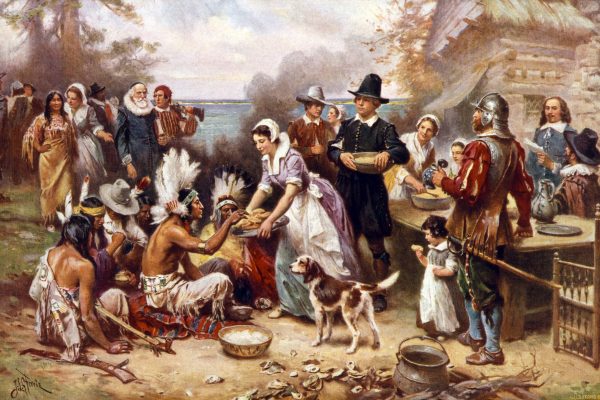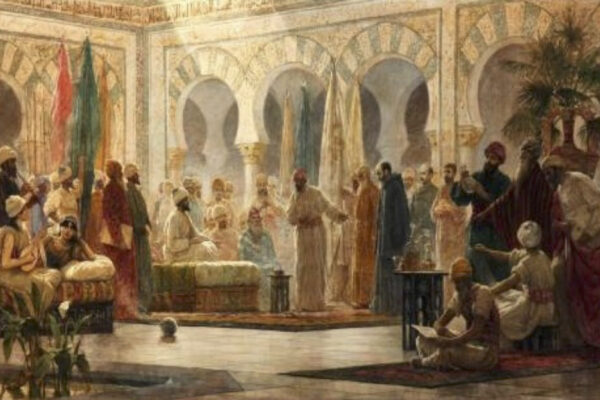Ali helped other early Muslim arrivals from Lebanon settle down in Lac La Biche, Canada.
Ali helped other early Muslim arrivals from Lebanon settle down in Lac La Biche, Canada.
On August 16, 1896, a family was travelling south of the Klondike River and, following long-famous rumours of there being gold in the region, decided to do some exploring on the way. In a pivotal moment in the history of the Yukon and Canada, they struck gold that day, sparking the famous Klondike Gold Rush. For the next three years, more than 100,000 miners set out from across the United States and Canada in hopes of getting their hands on the gold. The vast majority of them never got what they set out for, but the movement of so many people to a previously neglected region had many implications for Canadian history.
The Klondike Gold Rush had died out by 1899, but news travelled slowly. In faraway Lebanon in 1905, Hussein Abouchadi was travelling from his native village of Lālā in the historic Biqā‘a Valley to Beirut, 30 miles away, where he intended to board a ship to a distant country called Canada. He and his friend Sam Jamha had heard that there had been a gold rush there, and they hoped to take part in it. Accompanying him to Beirut was his 13-year-old nephew, Ali Ahmed Abouchadi. It is said that Ali had been herding his family’s sheep earlier on the day that Hussein set out and that he only tagged along only because he wanted to see Beirut.
It is unclear at which point Ali decided that he, too, wanted to go to Canada, but the decision had certainly been made by the time they reached Beirut. Hussein paid $24 for Ali’s bottom-deck ticket to Canada. When Ali boarded the ship, he is said to have had no personal belongings with him except for the clothes he was wearing. For most of the long journey to Canada, Ali was sick and possibly regretting his decision. However, the trio of Lebanese Muslims made it to Montreal later in 1905, where they stayed for a short while before taking a train to Winnipeg. There they met other Lebanese Muslims who had arrived even earlier and realized that the Klondike Gold Rush that they had been chasing had ended years ago. While in Winnipeg, a young Ali began peddling (trying to sell small items by going from door to door or person to person). The first item he peddled was fans made of paper, which he sold for 10 cents each.
Though the gold rush had ended, western Canada in the early years of the 20th century was still a land of opportunity. “Young man, go West,” was what Ali was repeatedly advised to do. In 1905, Hussein and Ali left Winnipeg and travelled to Edmonton, where they began to peddle dry goods on a horse-led wagon. The decision to have a moving business was a deliberate one. The two travelled throughout the region, peddling goods and trading for furs with the local Indigenous peoples. In 1906, they set up a store in the small town of Lac La Biche, Alberta, but in 1909 Hussein returned to Lebanon, leaving 17-year-old Ali Abouchadi to fend for himself.
By this time, Abouchadi had established good relations with the Cree-speaking Indigenous community in the area and was involved in the fur trade. He even learned to speak the Cree language, becoming perhaps the first (and one of only a few) Canadian Muslims to do so; he even invented Cree words for several items that he sold. However, the young man had a lot on his mind and later that year (in 1909) he closed his business in Alberta and moved to Saskatchewan, where he set up a homestead (i.e. a farm). Three years later he changed his mind again, selling his homestead for $1000 and re-opening his store and fur trading business in Lac La Biche. To fit more seamlessly into public life, he also changed his common name at this time to Alexander Hamilton.
In the following years, he helped other early Muslim arrivals from Lebanon settle down in Lac La Biche. One of these was Mohamed Abuali Gotmi, who was employed by Abouchadi upon arriving in 1911 but went on to become a successful entrepreneur himself. The outbreak of the First World War in 1914 affected the fur trade significantly, but Abouchadi reacted by expanding into other ventures. He took part in the construction of the Northern Alberta Railways, became the local agent for Ford Motor Company and International Harvester Co. (both US-based), and operated both a sawmill and a gas station in Lac La Biche. He also set up the first grain harvest in Lac La Biche, which he later sold to Gillespie Grain Co.
In 1919, Abouchadi suffered a serious setback in 1919 after a fire in Lac La Biche burnt most of the town to the ground, including his department store. However, by then he had become the most successful entrepreneur in town and was able to build an even bigger one to replace it. On top of that, in 1919 the Hudson’s Bay Company (HBC) shut down their operations in Lac La Biche, leaving Abouchadi as the most influential fur trader in the region.
Having achieved all of this, Abouchadi was still only 27 years old and remained as adventurous as ever. In 1925, Abouchadi moved to Fort McMurray, Alberta. There he built a floating store, much like the horse-led wagon out of which he and his uncle had started their business some 20 years earlier. The Hudson’s Bay Company routinely travelled up and down the rivers of northern Alberta and the Northwest Territories, selling goods to the Indigenous peoples in the area and buying furs from them. Abouchadi decided to do the same. Starting in Fort McMurray, he travelled north on the McKenzie River until he reached the Arctic Ocean. He took a break at the small settlement at Aklavik, Northwest Territories, where he witnessed the midnight sun—probably another first for a Canadian Muslim.
The Hudson’s Bay Company was not pleased with the competition, which may say something about the success of Abouchadi’s floating store. HBC successfully lobbied the government to have Abouchadi’s venture shut down. However, he continued to operate his many ventures in Lac La Biche. News of his success had by this time reached his native Lebanon, and sparked a gradual immigration of Lebanese Muslims to Lac La Biche.
In 1936, Abouchadi was awarded a contract by the federal government to build a breakwater in Lac La Biche, which became a very successful project. In the early 1940s, Abouchadi opened a new department store in Lac La Biche, larger than any he had owned before. However, the one-time young immigrant to Canada was now aging, and wanted to settle down with his family; thus when HBC returned to Lac La Biche in 1946 and offered to purchase his department store, Abouchadi sold it and moved with his family to Edmonton, which by then was home to a much larger Muslim community and also to Canada’s first mosque. There he set up a real estate business which he operated for many years.
Later in his life, Abouchadi made five trips back to Lebanon and made the Islamic pilgrimage to Makkah (in Saudi Arabia) twice. He married twice, first to a Lebanese Muslim woman (referred to as Josie) and then to a Ukrainian-Canadian woman who had converted to Islam. When he was once asked how he felt about his fateful decision to move to Canada, he said, “I’m proud of being a Canadian.” On December 10, 1985—eighty years after he first landed in Montreal—Ali Ahmed Abouchadi passed away in Edmonton, Canada. A park and pond just outside of Lac La Biche are named in honour of “Alexander Hamilton”.
——————————
Sources: Linda Goyette and Carolina J. Roemmich, Edmonton in Our Own Words (Edmonton: University of Alberta Press, 2005), p. 241; Earle H. Waugh, “Reducing the Distance: A Muslim Congregation in the Canadian North,” in American Congregations, Volume 1: Portraits of Twelve Religious Communities, ed. James P. Wind and James W. Lewis, 572-611 (Chicago: University of Chicago Press, 1994); see also [1], [2], [3], [4]
by Hassam Munir for iHistory





